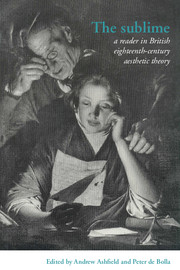Book contents
- Frontmatter
- Contents
- List of Abbreviations
- Introduction
- Part I The Longinian tradition
- Part II Rhapsody to rhetoric
- 11 The spectator, (1712-1714)
- 12 A discourse on ancient and modern learning (1734)
- 13 Characteristicks (1714)
- 14 The works (1724)
- 15 To David Fordyce, 18th June 1742
- 16 The pleasures of imagination (1744)
- 17 An essay on the sublime (1747)
- 18 Observations on man (1749)
- 19 Lectures on the sacred poetry of the Hebrews (1753/1787)
- 20 A dictionary of the English language (1755)
- 21 Conjectures on original composition (1759)
- 22 The art of speaking (1761)
- 23 A course of lectures on oratory and criticism (1777)
- 24 An enquiry concerning the principles of taste (1785)
- Part III Irish Perspectives
- Part IV The Aberdonian Enlightenment
- Part V Edinburgh and Glasgow
- Part VI From the Picturesque to the Political
- Sources and further reading
19 - Lectures on the sacred poetry of the Hebrews (1753/1787)
Published online by Cambridge University Press: 05 June 2012
- Frontmatter
- Contents
- List of Abbreviations
- Introduction
- Part I The Longinian tradition
- Part II Rhapsody to rhetoric
- 11 The spectator, (1712-1714)
- 12 A discourse on ancient and modern learning (1734)
- 13 Characteristicks (1714)
- 14 The works (1724)
- 15 To David Fordyce, 18th June 1742
- 16 The pleasures of imagination (1744)
- 17 An essay on the sublime (1747)
- 18 Observations on man (1749)
- 19 Lectures on the sacred poetry of the Hebrews (1753/1787)
- 20 A dictionary of the English language (1755)
- 21 Conjectures on original composition (1759)
- 22 The art of speaking (1761)
- 23 A course of lectures on oratory and criticism (1777)
- 24 An enquiry concerning the principles of taste (1785)
- Part III Irish Perspectives
- Part IV The Aberdonian Enlightenment
- Part V Edinburgh and Glasgow
- Part VI From the Picturesque to the Political
- Sources and further reading
Summary
Lecture XIV
Of the sublime in general and of sublimity of expression in particular
… The word sublimity I wish in this place to be understood in its most extensive sense: I speak not merely of that sublimity, which exhibits great objects with a magnificent display of imagery and diction; but that force of composition, whatever it be, which strikes and overpowers the mind, which excites the passions, and which expresses ideas at once with perspicuity and elevation; not solicitous whether the language be plain or ornamented; refined or familiar: in this use of the word I copy Longinus, the most accomplished author on this subject, whether we consider his precepts or his example.
The sublime consists either in language or sentiment, or more frequently in an union of both, since they reciprocally assist each other, and since there is a necessary and indissoluble connection between them: this,
Whose own example strengthens all his laws,
And is himself the great sublime he draws.
Pope.however, will not prevent our considering them apart with convenience and advantage. The first object, therefore, which presents itself for our investigation, is, upon what grounds the poetic diction of the Hebrews, whether considered in itself, or in comparison with prose composition, is deserving of an appellation immediately expressive of sublimity.
- Type
- Chapter
- Information
- The SublimeA Reader in British Eighteenth-Century Aesthetic Theory, pp. 106 - 110Publisher: Cambridge University PressPrint publication year: 1996



